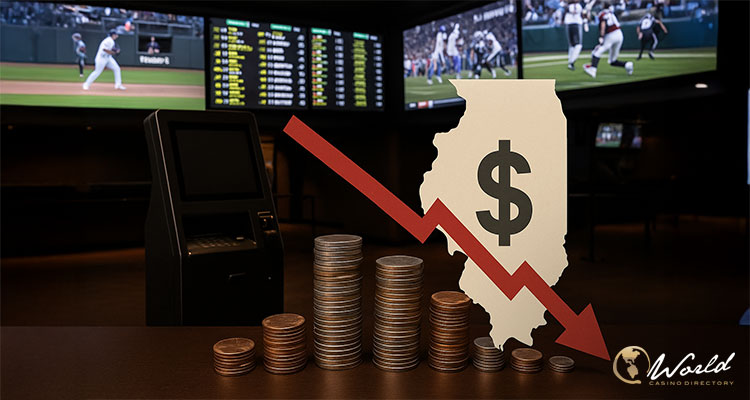Illinois’ sports betting industry experienced a pronounced drop in wagering volume this September, marking the first full month under the state’s newly implemented per-wager tax. Data from the Illinois Gaming Board (IGB) and statements from industry groups show that bettors placed five million fewer bets compared to September 2024, amounting to about a 15% year-over-year decline in total wagers.
According to the Sports Betting Alliance (SBA) of Illinois, operators and players felt the effects of the new tax policy almost immediately. The group noted that “when compared to September 2024, the September 2025 data shows that 5 million fewer bets were placed in Illinois — or a 15% decrease,” citing IGB figures. SBA spokesperson Maura Possley emphasized that the trend demonstrates a meaningful shift in betting behavior. “It shows that bets plunged in Illinois after the law was put in place and is a red flag that Illinois sports fans are fleeing the legal betting market in favor of the cheaper, illegal market,” Possley told The Center Square.
Fees, Surcharges, and Minimums Reshape Bettors’ Behavior
Illinois law now requires wagering operators to pay a 25-cent fee on each online or mobile bet through the first 20 million wagers, with the amount doubling to 50 cents per bet after that threshold. Most operators responded by instituting small minimum bet sizes, but major platforms like DraftKings, Fanatics, and FanDuel chose to impose direct surcharges on each wager instead.
By September, FanDuel and DraftKings had already crossed the 20-million-bet threshold and began incurring the higher 50-cent fee, prompting both companies to pass those costs along to customers. FanDuel charged users 50 cents per bet beginning September 1, while DraftKings applied either 25-cent or 50-cent surcharges depending on the user. Other platforms, including bet365 and Caesars, announced similar plans, although not all had implemented them by late September.
Despite the sharp decline in total bets, the amount of money wagered—referred to as handle—continued to rise. IGB data shows online tier-one handle reached $434.5 million in September, up from $416.8 million the prior year, while tier-two handle grew from $676.7 million in 2024 to $782.3 million in 2025. As Flutter CEO Peter Jackson summarized on a recent earnings call, “As you’d expect, we’re seeing a reduction in the number of bets there, but increasing handle per bet.”
Industry Warnings and Growing Concern Over Illegal Markets
Possley and the SBA warn that Illinois’ escalating tax burden—combined with a progressive adjusted gaming revenue (AGR) tax that now tops out at 40%—is pushing operators and bettors away from the legal market. “Coupled with Illinois’ 2024 graduated tax, the state’s per-wager tax has made the taxes paid by legal sports betting customers here one of the highest in the country while the unregulated, illegal market is rapidly expanding – without any consumer protections and without any oversight,” the trade association said.
Possley reiterated those concerns, saying, “Overtaxing legal betting will send bettors either outside state lines, city lines, or to the predatory illegal market and have profound negative implications for the legal market and also future tax revenues here.” She added that national earnings reports indicate sports betting is growing elsewhere, making Illinois’ trend an outlier.
Illinois Attorney General Kwame Raoul and others have pressed the U.S. Department of Justice to prioritize illegal online gaming. “You see agreement among all of the attorneys general across the country that the illegal market is a serious concern. It’s rapidly expanding without any consumer protections and zero oversight,” Possley said.
Revenue Increases for the State—But With Potential Long-Term Risks
Despite industry pushback, the state’s new tax regime has produced meaningful short-term revenue gains. Illinois collected more than $10.5 million from the per-wager tax in September alone and more than $21 million in the first quarter of the fiscal year. Combined with AGR taxes, the state generated $27.8 million from sports betting in September and nearly $99 million in the quarter. A separate 2% Cook County tax brought in an additional $1.1 million.
However, the SBA argues that these gains may not be sustainable if bettors continue migrating to untaxed platforms. Possley warned that further taxation—such as Chicago Mayor Brandon Johnson’s proposal for an additional 10.25% city gambling tax—would be “unprecedented” and could accelerate the shift toward illegal operators. She noted that the downturn in Illinois’ legal betting market should serve as a serious signal to policymakers.



